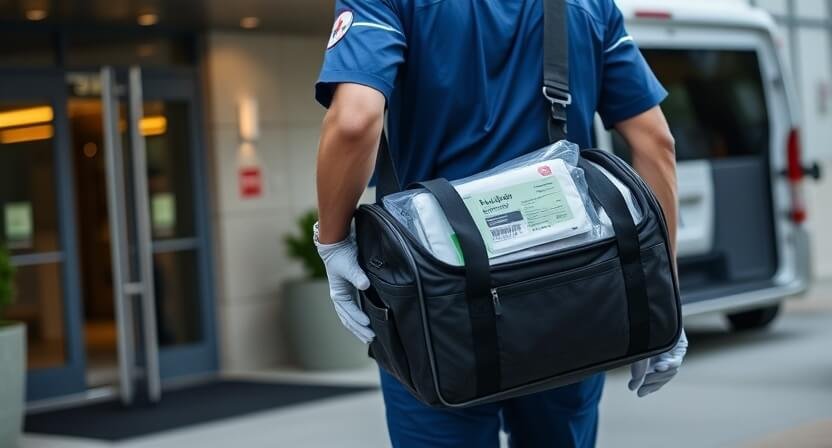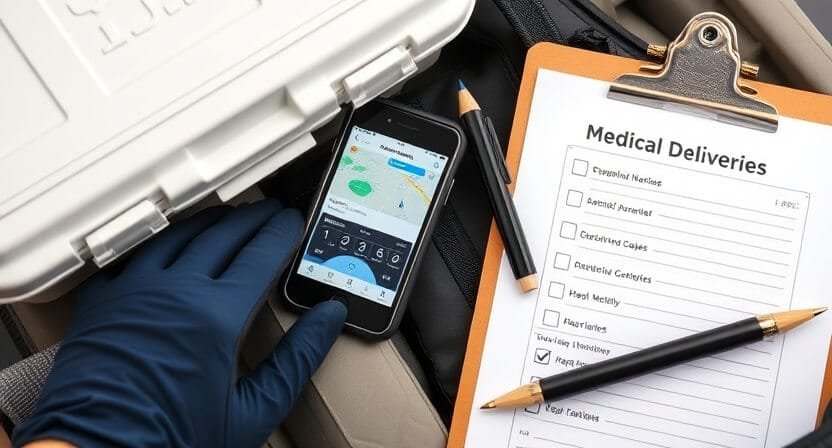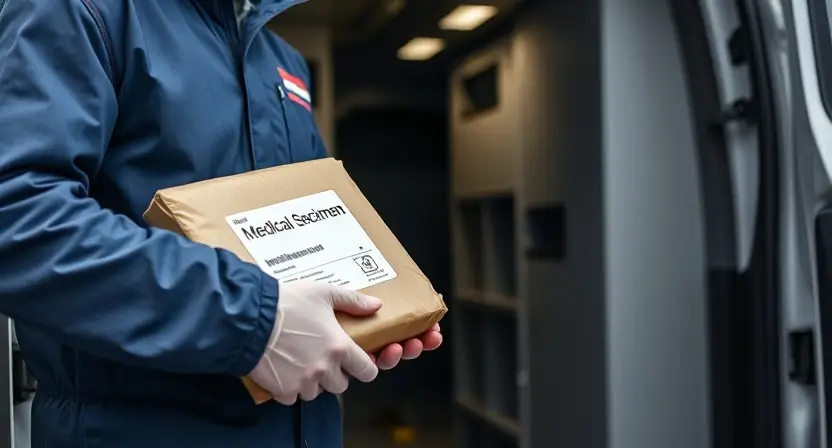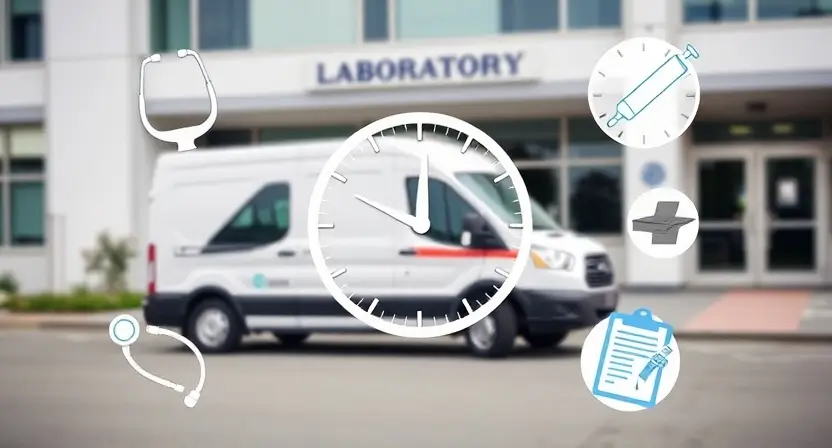The healthcare industry runs on precision and reliability. Behind the scenes, thousands of medical couriers ensure timely delivery of everything from lab samples to vital medications. For those looking to enter a flexible and in-demand field, becoming a medical courier independent contractor offers an ideal career opportunity.

Whether you’re a student seeking supplemental income, an experienced courier exploring a rewarding niche, or looking for an independent contractor role with a purpose, this guide will help you understand how to get started.
Here’s everything you need to know about becoming a medical courier independent contractor, the steps involved, and why it might just be your ideal gig.
What is a Medical Courier?
A medical courier is responsible for transporting sensitive healthcare items such as blood samples, lab specimens, medical equipment, medications, and even confidential documents between facilities. Their role is vital in helping doctors, labs, pharmacies, and hospitals maintain smooth operations, often under strict time constraints.

Unlike standard delivery drivers, medical couriers must pay special attention to regulations (such as HIPAA compliance), follow sanitizer protocols, and ensure the items are handled carefully to preserve quality and avoid any contamination risks.
What Does an Independent Contractor Mean?
Independent contractors work on a flexible, freelance basis. Instead of being employed by one company, you provide services to various organizations under a contract. Medical courier contractors have the freedom to set their schedules, choose their clients, and often earn income on their terms.
Now that you understand the basics, here’s a comprehensive step-by-step guide to help you launch your career as a medical courier independent contractor.
Step 1: Determine If This Role Is Right for You
What Skills and Qualities Do You Need?
Being a successful medical courier requires a mix of hard and soft skills, including:
- Reliability: The healthcare sector depends on timely deliveries, so punctuality is a must.
- Attention to Detail: Handling sensitive medical items means following strict procedures.
- Communication Skills: You’ll often coordinate with healthcare staff or receive last-minute instructions.
- Technology-Friendly: Familiarity with delivery apps, GPS systems, and client platforms is essential.
- Driving Record: A clean driving record is typically a non-negotiable requirement.
This position suits those who value independence, thrive in structured environments, and don’t shy away from time-sensitive tasks.
What Are the Benefits of Becoming a Medical Courier?

Some of the top benefits of this career path include:
- Flexible Hours: You decide when and how often you work as an independent contractor.
- Lucrative Niche: With the growing demand for medical couriers, there’s steady work available.
- Purposeful Work: You play a critical role in patient care and healthcare system efficiency.
- Low Startup Costs: Compared to many self-employed roles, becoming a medical courier has minimal initial expenses.
Step 2: Meet the Requirements
Basic Requirements
To work as a medical courier independent contractor, you will need to meet these baseline qualifications:
- Valid Driver’s License
You must have a valid driver’s license for the state you intend to work in.
- Reliable Vehicle
While not always required, owning a well-maintained car (or in some cases, a larger vehicle for bulk items) is often necessary. Fuel economy is a major consideration since you’ll spend hours on the road.
- Vehicle Insurance
Adequate commercial vehicle insurance is often needed for independent contractors. Basic personal insurance may not cover medical goods transportation.
- Clean Driving Record
Employers or clients will request to see your record to ensure safety compliance.
- Background Check
Given the sensitive nature of the items you’re handling, most companies require background checks for legal, security, and professional reasons.
- Knowledge of Local Routes
Familiarity with your local area or potential service zones can save time and reduce stress during deliveries.
- Physical Fitness
Some deliveries involve carrying heavy medical equipment or items, so basic physical fitness is handy.
Step 3: Invest in Specialized Training
While a formal college degree isn’t required to become a medical courier, specialized knowledge can set you apart from other freelancers. Consider enrolling in certifications that enhance your credibility.

Recommended Certifications Include:
- HIPAA Training
This helps you understand the importance of protecting patient privacy and ensuring compliance with the healthcare industry standards.
- OSHA Bloodborne Pathogens Certification
If you’ll be transporting blood samples or biological specimens, this certification is valuable.
- Medical Courier Training
Some programs or local training organizations offer courses tailored to medical courier logistics, acting as a powerful CV addition.
Step 4: Research the Market and Potential Clients
To be successful as an independent contractor, you’ll need to connect with potential clients and employers. This involves understanding how demand fluctuates in your market.
Who Will You Be Working With?
Medical couriers typically serve clients in the following sectors:
- Laboratories
- Hospitals and Clinics
- Nursing Homes and Assisted Living Facilities
- Pharmacies
- Blood Banks
- Specialized Medical Testing Centers
Sign Up with Courier Platforms
Platforms like CBDriver, Courier Express, or local gig boards often post freelance contracting opportunities for medical couriers. Joining these platforms can help you land your first job while growing your connections in the space.
Step 5: Prepare Your Business Essentials
Starting as an independent contractor may require setting up a basic business structure. Simple steps include registering as a sole proprietor or LLC for legal purposes, maintaining accurate financial records for tax benefits, and acquiring any required permits or licenses in your state.
Be sure to track expenses for write-offs such as mileage, commercial insurance, car maintenance, and supplies. Many apps like QuickBooks or Wave make it easy to manage finances on the go.
Step 6: Nail Your First Jobs
Once everything is in place, it’s time to start your work and build your reputation! Success in this field depends on delivering consistently and establishing excellent relationships with clients.

Tips for Success in Your First Week
- Plan Routes Ahead to optimize efficiency for multiple deliveries.
- Communicate Clearly by confirming pickups and drop-offs with both clients and recipients.
- Be Punctual – even a few minutes can matter in the medical industry.
Step 7: Expand Your Opportunities
Over time, you can work toward growing your income and client base with these tips:
- Diversify Services
Expand your delivery options to include non-medical goods or emergency deliveries.
- Network Like a Pro
Content consistency creates lasting partnerships. Be prompt, dependable, and professional when working with challenging clients.
- Ask for Reviews
Positive testimonials can help you secure ongoing contracts down the line. Don’t hesitate to ask satisfied clients to leave reviews.
Your Flexible Career Awaits
Becoming a medical courier independent contractor offers flexibility, purpose, and the perfect entry to a growing niche. Whether you’re a student seeking short-term income, an aspiring entrepreneur, or someone drawn to the healthcare world, this role can provide opportunities that align with your lifestyle and passions.
The road to success begins with preparation—and now, you’re armed with the knowledge to succeed. Start today by researching local opportunities and certifications to bring you closer to this dynamic career.


